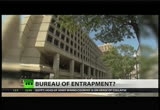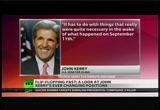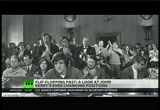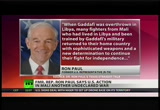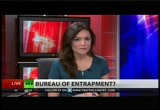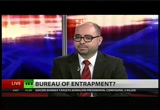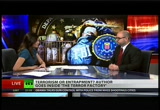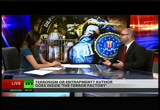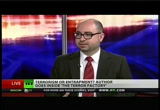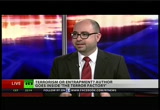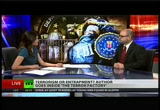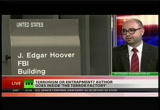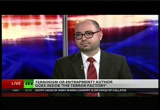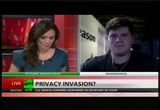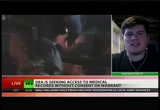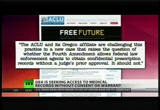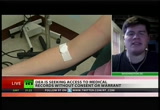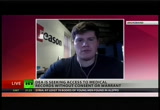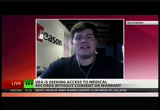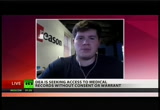tv [untitled] January 30, 2013 4:00pm-4:30pm EST
4:00 pm
he's america's top diplomat but will john kerry stick to his word or will he change his mind and flip flop as he's known for doing a look at his past record and what it might say about his future actions. and foiled terror plots might be the f.b.i. its claim to fame in the post nine eleven era when the f.b.i. becomes a player in these plots we want to know if their targets are really photos or being and trapped party questions more. and if you thought doctor patient privilege was the rule of law think again the drug enforcement officials are getting up close and personal with patient records in oregon this time without a warrant had
4:01 pm
a critical look at the pulse of the privacy issue. it's wednesday january thirtieth four pm here in washington d.c. i'm liz wall and you're watching our t.v. . we begin today with news from syria reports from the region confirmed that israel has launched an attack on weapons allegedly destined for has bullah a political group in lebanon allied with the assad regime in iraq and iran the attack occurred on the syrian side of the country's border with lebanon this according to reuters and while international efforts have failed to stop the bloodshed in syria one member of the syrian opposition is offering an olive branch through facebook a top syrian opposition leader she was al-khateeb posted an offer on his facebook to meet with are presented of the assad regime previously off its
4:02 pm
he was firmly opposed to talks with the government set the following terms the release of one hundred sixty thousand prisoners and the renewal of expired syrian town sports his facebook post was sharply rebuked by other members of the syrian opposition who remain steadfast in their refusal to talk to the assad government clarified in a later post that he was voicing his personal opinion not the opinion of the entire opposition however he described other members of the opposition as sitting on their couches while saying quote attack don't negotiate is a conflict that has resulted in the reported deaths of more than seventy thousand syrians remains filled with different factions who are not always on the same page . now taking a look at the u.s. is new top diplomat yesterday the senate confirmed john kerry's nomination as secretary of state welcoming him with open arms but we want to take
4:03 pm
a look back now at his past a past where the former presidential candidate gained a reputation as a flip flopper back then his critics were quick to point that out. now there's nothing wrong with a little even decision as long as your job doesn't involve responsibly. john kerry has changed his mind time and time if you don't. want. to. follow here are just some of the reasons why he's been labeled a flip flopper kerry joined ninety seven other senators in october of two thousand and one for voting for the patriot act during a speech he made on the campaign trail in new hampshire back in two thousand and three he said this about the patriot act quote it has to do with things that really were quite necessary in the wake of what happened on september eleventh but five years later at a speech in iowa in two thousand and eight he was
4:04 pm
a proponent of quote replacing the patriot act with a new law that protects our people and our liberties at the same time and that's not all when it comes to going to war in this case it was the iraq war is seems like he was for it before he was against it here is defending his stance during his senate run after losing the two thousand and four presidential race i voted the way i voted because i thought it meant the national security interests of our country that would have been the power i wanted as president but i would have used the power john why is really something george bush did not do which is why i have opposed it since day one. even when it comes to spilling government secrets he's changed his stance when we get leaks first dumped its top secret government documents he was quoted as saying however legally these documents came to light they raise serious questions about the reality of america's policy toward pakistan and afghanistan those policies are at
4:05 pm
a critical stage in these documents may very well underscore the stakes and make the calibrations needed to get the policy right more urgent. but later it appears he doesn't think so highly of the whistle blowing web site yes there is real damage social security numbers of individuals have been made public. technology about roadside bombs has been made public the relationship of the president. who is involved with us and helping to fight the best actor in yemen has been exposed for parts of his relationship with the united states that could be very damaging to our efforts there there are many similar kinds of efforts germany. now kerry is known for taking and he war stances he was after all a spokes person for a peace group of vietnam veterans against the war even before testifying before congress the worry for like minded antiwar advocates is how easily he may flip flop
4:06 pm
from his previous answer war stance. which turned out somalia where french forces are declaring victory as after they intervened in the country three weeks ago their aim is to stop islamist militants from seizing control of the country french in mali and troops retake the major towns of gallon timbuktu over the weekend right now the u.s. is helping france by providing intelligence and aiding with the transport and refueling missions well at this point u.s. officials say there are no plans to put soldiers on the ground and mali but there are some that fear this is the lead up to another war among those former presidential republican presidential candidate ron paul who has gained many followers for his anti interventionist views he says many questions about the extent of u.s. involvement there have gone on answered. media questions as to whether the u.s. has special operations forces grounds or cia paramilitary military units active in
4:07 pm
mali are unanswered by the administration congress is ask you questions and demanded two answers from the president as usual it was not even consulted but where does the president get the authority to become a coke in front of operations in mali even if u.s. troops are not yet overtly is in the attack of the texas congressman goes on to compare the french intervention in mali to what transpired in libya he said quote when gadhafi was overthrown in libya many fighters from mali who had been who had lived in libya and been trained by gadhafi as military returned to their home country with sophisticated weapons and a new determination to continue their fight for independence for northern mali bust the france initiated action against libya and two thousand and eleven led to a new lion lence and instability and mali that france decided it must also
4:08 pm
address well with media access restricted in mali the war there is virtually invisible with photographs inaccuracy to sticks almost impossible to obtain now many questions remain as to what exactly is going on there. well from overseas interventions in cases of entrapment here at home we all know that the government has been relentless in its mission to find and catch potential terrorists one tactic the federal bureau of investigation uses is hiring informants to infiltrate communities where suspects live and catch them in the act or at least talk about possibly committing an action in the future a problem with this approach critics say is that the criminal activity would never have taken place if it weren't for the f.b.i. informants egging them on some examples mohammed mahmoud was arrested in november two thousand and ten after he attempted to detonate a bomb at the portland christmas tree lighting ceremony this next gentleman was
4:09 pm
detained on october seventeenth two thousand and twelve for attempting to use car bombs to blow up the new york federal reserve building and then there's the cleveland five they were arrested on april thirty first two thousand and twelve after they attempted to blow up a law a two bridge over the valley national park. so could the f.b.i. be creating terrorists and set of catching them our next guest has done extensive research on this topic and details it all and his book the terror factory there it is on the screen trevor aaronson joins us now in our d.c. studio trevor it's great to have you here thanks for having us so what inspired you to write this book you know beginning in two thousand and six i began to see these cases that the bureau and the and that i was just as was putting forward a dangerous plot to do it for other terrorists who was about to attack a large building a terrorist that was about to attack a public square and what i begin to see was that none of these people actually had
4:10 pm
the capability it was the informant or the undercover agent who found people who were on the fringes of society and at times offered them inducements but then provided all of the means necessary to move forward with their crime you know for example these men never had access to weapons but through these elaborate sting operations the f.b.i. provided these weapons and so this book documents the of the five hundred cases the terrorism cases the f.b.i. the d.o.j. have brought this man eleven how many of the involved real terrorism and so many more were actually these sting operations actually a hundred fifty defendants as nine eleven were involved in sting operations that where they never had the capacity to commit crimes on their own so you're saying that the f.b.i. without the help of the f.b.i. they didn't have the resources they don't have the weapons they could have done it without the help of the f.b.i. absolutely you know there are examples where some of these some of these men didn't even have enough money to pay their rent and in other cases they were mentally ill there was a man the caught in a sting operation in seattle for example at schizoaffective disorder which are there which means that he has trouble distinguishing between route reality and
4:11 pm
fantasy will someone like that is obviously very susceptible to an informant who says hey we should move forward to terrorism plot you know i can make this happen this is what we should do and what's happening is that through these sting operations the f.b.i. is drawing in people on the fringes who are very susceptible who for whatever reason hate the united states but on their own have no capacity to commit a crime to commit an act of terrorism and in the meantime. real tera such as pfizer says auto came close to bombing times square times square they aren't being caught in the sting operations also the sting operations are drawing in people who are odious or hateful but on their own have no capacity for terrorism and arresting so you're saying about these people these examples that you point out are these kind of out of the norm or or is this the norm that these are the people that are targeted this is the new normal i mean in a sense when you know you mention close enough as for example the man who tried to detonate a bomb at the federal reserve building you know here was a guy who had nothing his father had spent all his money to bring him over to bangladesh he never had access to any weapons he never had any contact with al
4:12 pm
qaeda or a terrorist organization it was actually an undercover agent who put who posed as an al qaeda operative operative provided everything he needed provided the bomb provided the transportation provided the money and that allowed him to commit this crime what we're seeing more and more of the same operations as people who are on the fringes who are desperate sometimes mentally ill and they're the ones being being caught in the sting operations what we aren't seeing are people like that people who are desperate who want to do something commit an act of terrorism and then finding on their own an al qaeda operative who provides the means that all of these cases it's only the f.b.i. that's providing the means and opportunity for these crimes now your book looks into who exactly these informants are these people and government and higher rates to be these and for men who do they usually pick to carry out these jobs you know what i point out is that there's a real question of whether the government is using criminals who are worse than the ones they're targeting you know for example in some cases they've used in one case it was a child molester in seattle and another case they use accused murderer from from
4:13 pm
pakistan who had committed. and declared bankruptcy didn't tell the court that he had five hundred thousand dollars overseas in many cases they've used drug dealers these people with criminal records who ultimately target people who do not have criminal records but who say they want to commit an act of terrorism in these informants who at times have a financial incentive you know informants can make one hundred thousand dollars or more. or in a terrorism case you know even financial incentive to find someone to commit a crime and ultimate that's what they're able to do and i think this raises a real question about justice you know it is this is as much a story about terrorism as it is about justice because how fair is it that all two of the top of the informants that are targeting these men have this great financial incentive to find people who want to commit acts of terrorism and as a result of that they're ultimately finding people who are on the fringes of society who are set are economically desperate or are mentally ill how common are these cases of entrapment you know of the five hundred prosecutions that the the government has brought since nine eleven the majority are actually minor crimes they are you know someone wanted for immigration violations that later accused of
4:14 pm
terrorism or lying to the f.b.i. what we can say is that of the five five hundred one hundred fifty are actually sting operations and then you know we can only count across a handful such as five or knowledgeable as you came close to bombing the new york city subway system as actual true real terror suppose a direct threat and you're saying you know that these examples they're part of this terrorism prevention program as it's called if these people post serious threat is the government justified in carrying out these missions to stop them before they carry out an attack i know you had mentioned a lot of them are not but in some cases is it justified that the government's view is that they want to stop the terrorists of tomorrow today so they want to find them just before they act what i criticize in the book is that there's little evidence is just that we're not for the f.b.i. coming in and. providing the means and opportunity that they never could have on their own receive the means and the opportunity you know for example there been
4:15 pm
more people killed since nine eleven by lone gunman than there have been by so-called lone wolf terrorist with al qaeda sympathies and so what that suggests is that there are actually to crew to commit a horrific act of terrorism united states isn't difficult it doesn't require a large amount of means but we're not seeing terrorists with al qaeda sympathies commit these crimes instead it's lone gunman for example so that. suggest that the f.b.i. is perfect in its mission and of pulling off terrorists of tomorrow today or that the threat that they prose is not what the government has portrayed them to be. interesting you know your book has sparked a good deal of controversy those that really commend you for your research and what you've revealed others really do defend these f.b.i. sting operations why do you think it's so divisive i think that what this has brought forward is a divide within the f.b.i. there is there is a lot of disagreement within the bureau about whether these programs are the most effective whether the efficacy of these programs is worth the effort and expense involved you know critics of these programs. criticize them for the same reasons i
4:16 pm
do that there is a question of whether these people are would have committed terror acts of terrorism on their own whether the f.b.i. through these elaborate sting operations is ultimately getting them involved in crimes that on their own they never had any opportunity to get involved with that said the people who defend this this policy they believe that this is a way of getting terrorists off the street now. where i criticize that argument is ultimately they ultimately they ultimately cite as the defense of this program real terrified knowledgeable as ozzy and none of these men are actually caught in sting operations you know none of the real terror supposed threats were ever aware of by the f.b.i. through sting operations old when the sting operations aren't catching people who likely would have committed an act of terrorism tomorrow now why do you think the government has resorted to using this tactic and using it more often i think this is a bureaucratic problem every year congress gets three billion dollars to fight counterterrorism can't go to the i guess three billion dollars in congress to fight counterterrorism
4:17 pm
and the f.b.i. can't spend three billion dollars and go back to congress and say hey we spent all your money and we can find a tear in the sting operations provide a very convenient mechanism for the f.b.i. to show the congress and the people and the public hey we're keeping you safe here's a here's a terrorist attack that was thwarted you know if you look at f.b.i. director robert mueller testimony before congress the last few years he consistently cites these terrorism sting operations he talks about the elaborate scope of this of the the plots how horrific they would have been but he never fully disclosed as to congress the fact that these people never on their own never would have the capacity it was an f.b.i. informant incentivized by money who ultimately provided the means and the opportunity for these crimes very interesting trends are great at how do you align and chad some light on this issue that was trevor errants had author of the terror factory. still out here on our t.v. the next time you go to the doctor because of what information you disclose drug enforcement officials are trying to get their hands on your medical records without a warrant we'll examine what this means for patients rights.
4:18 pm
4:19 pm
your medical records are for your and your doctor's eyes only right not of the drug enforcement administration gets away in the state of oregon the da is trying to get access to private prescription records of patients without a warrant this is part of an effort to crack down on abuse of prescription pills but the a.c.l.u. is challenging this practice they say this is a violation of our fourth amendment rights to discuss i'm joined now by mike riggs associate editor for reason magazine mike nice to see you there so does this state law block the government from obtaining this information isn't there a state law that prevents this. it should oregon like every other state has taken
4:20 pm
steps to address what's being called a prescription pill epidemic and oregon did so by creating a secure database where doctors would be able to report on troubled patients. to the state but they would also they would report all patients not just troubled ones would be like i've described this much of this to this person and the idea being that you know a maybe a collaboration between public health officials and doctors would allow doctors to find out which of their patients were taking too much of a drug or had developed problems. and the oregon legislature said we're going to you know we're going to create this law are going to create this policy but because it does reveal so much about patients we're going to put some really strict privacy protections on this information. the v.a. doesn't like the strict privacy protections it doesn't think that they should have a warrant or any probable cause to be able to write for the files contained in oregon database so it is suing to be able to get access to organs for scritching
4:21 pm
database without a warrant so you know in a lot of cases law enforcement agencies want to find out what doctors are prescribed they're going to have to prove to a judge that you know that they pulled over a patient and they had four bottles of oxy gone when they only have a prescription for one or they have no prescription at all the d.a. is arguing that he shouldn't have to prove any of that that if there's a database with this information in it that it should automatically be available and. the state of oregon that they're fighting this me c.l.u. is also speaking out against this i want to pull up a quote there from a statement that they made on this issue the a.c.l.u. and its oregon affiliates are challenging this practice in a new case that raises the question of whether the fourth amendment allows federal law enforcement agents to obtain confidential prescription records without a judge's trial prior approval it should not they say so michael what fourth
4:22 pm
amendment rights concerns does this raise. all of them i mean this is you know the fourth member protects us from unreasonable searches and seizures. oddly enough this is the argument that the v.a. is using and i should i should correct in earlier statements actually the state of oregon the suing the da but the argument of the d.e.a.'s using is that the you know the fourth member texans only apply to patients. it does not apply to any information they transmitted to a third party the third party being their doctor or their pharmacist which is kind of interesting because it makes it sound to the relationship is not between doctor and patient but it's between patient and v.a. and that the doctor is sort of orbiting out there and that anything transmitted between patient and doctor should be available to the da and the the legal argument that the d.a. is using is that if a patient gets a prescription from a doctor. this is the same as the patient putting their trash out at the curb and
4:23 pm
that once once the prescription has been filled or issued and like once the trash isn't put out the curb it becomes publicly available information which is kind of ridiculous and they feel you as is working really hard to point out that you know this is totally an abuse of language in the law by the v.a. so. they went. the da of course is defending this they're saying that this is all in an effort to crack down on the problem of prescription drug abuse if so should it be allowed in some cases what do you think . i don't i don't know how you know obviously this is why law enforcement groups always say we only want to break the constitution for this purpose of small specific thing and the truth is these sort of abuses in the being you know they they moscow's over them they become codify they become part of the legal landscape
4:24 pm
if. the state of oregon loses its case against a. drug enforcement administration and other law enforcement groups will be able to use this argument to not just crafter the prescription pill up epidemic where they could you know five years down the road maybe use it to go after somebody who. i don't know just imagine the possibilities for abuse are endless and we know this because the fourth amendment is being abused kinds of ways so you're saying that this is setting a dangerous precedent if the state of oregon loses it absolutely once. so this is all going on and. why should you know the average american be worried about this. well because it's you know the biggest case right now is in oregon and it's being it's sort of being depicted by some people the case about federalism but the truth is the strategy being used by the office of national drug control policy and
4:25 pm
state and local law enforcement groups across the country is a strategy designed specifically to thwart regulations in place to protect patient privacy and two thousand and eleven the obama administration released a document sort of a strategy document and publicly available strategy document i might add for combating the prescription pill epidemic and some of the language and i don't have it in front of me right now but it essentially said let's come up with ways to get around laws and regulations governing privacy that serves no other policy purpose so you know if you are a drug warrior and you see these laws you're like well i don't understand what this does for me if you're patient you see those laws a lot differently. and that that's been a signal to local law enforcement groups across the country saying like you know what be inventive trying find ways to get around the fourth amendment i think that's a really really horrifying thing for our government to be encouraging. and it's even if you don't live in oregon you don't know what your local police department
4:26 pm
you know what sort of scheme they're coming up with to be able to access not just the patient records of people who are maybe trafficking and not actually gone but also your records because when they go after a doctor's office or a pharmacy they don't just take the records of people who they think they're going bad think they take everybody's records. we don't have too much time but i want to ask you i noted oregon is not alone and dealing with this problem and with the government trying to get increased power and trying to tackle this problem i understand that florida has had some similar concerns what is the government over there done to tackle this problem of prescription drug abuse. well in different parts of the states you've seen police groups see different things in southwest florida the sheriff's department wrote essentially a waiver. they then asked doctors to slip into forms that their patients on they come in for appointments then a waiver saying you're sorry if you sign this we have resigned over your medical rights except that waiver did not say that it had been written by the sheriff's
4:27 pm
department in central florida the. anti-drug task force composed of local law enforcement groups in and of getting a warrant for some patient records from a doctor's office but then when they did the search they ended up taking patient records for every patient at the doctor's office it was supposed to be for something like twenty and it up being for i think you were in the hundreds or maybe over a thousand so in both both of those examples i mean obviously the one self was floored it didn't really work out for the cops which i think is for the press in central florida you know here was a guise of we're going to do this and up taking information on people that they don't have warrants for. a lot of implications here you know you think of your doctor patient relationship that's supposed to be a very you know confidentiality is top priority they're so this is a very eye opening here and appreciate you coming on the show and talking about it that was mike reg's associate editor for reason magazine. that isn't a do it for now but from one of the stories we cover check in our you tube channel
4:28 pm
4:29 pm
35 Views
Uploaded by TV Archive on

 Live Music Archive
Live Music Archive Librivox Free Audio
Librivox Free Audio Metropolitan Museum
Metropolitan Museum Cleveland Museum of Art
Cleveland Museum of Art Internet Arcade
Internet Arcade Console Living Room
Console Living Room Books to Borrow
Books to Borrow Open Library
Open Library TV News
TV News Understanding 9/11
Understanding 9/11
